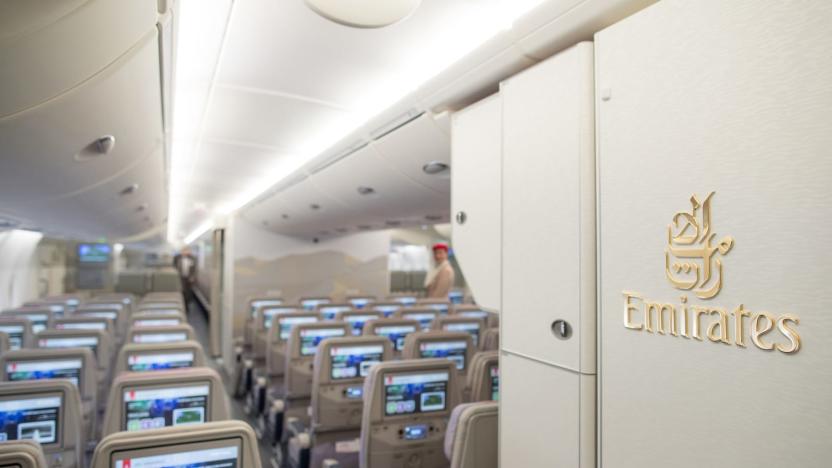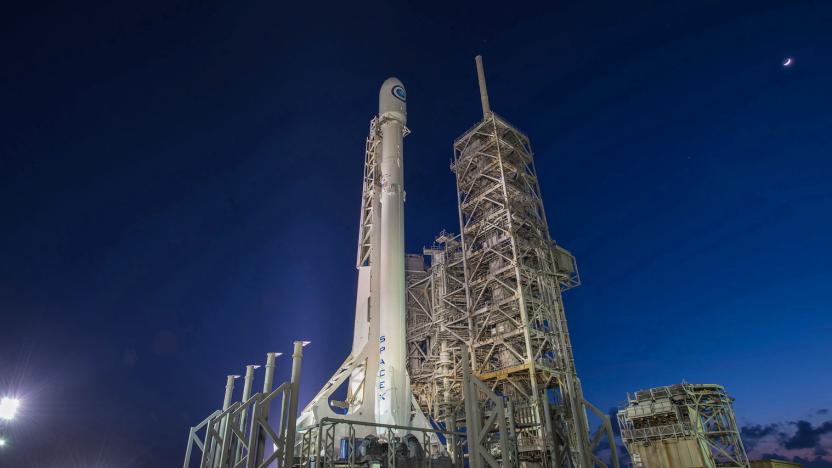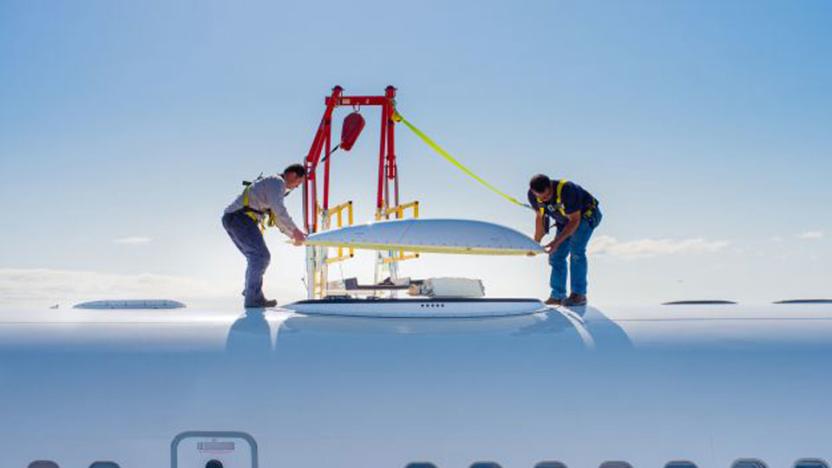inmarsat
Latest

Two airlines are bringing faster WiFi to their international flights
Two airlines have made moves to upgrade their WiFi offerings today. Cathay Pacific Group will provide GoGo's 2Ku satellite-based broadband technology starting in 2018 and Emirates has partnered with Thales to bring 50Mpbs connectivity to its Boeing 777X fleet in 2020.

Watch SpaceX push the Falcon 9 rocket to its limits (updated)
SpaceX launches are seldom boring, but its next mission will be notable precisely for what isn't happening. Elon Musk's outfit is poised to launch the Inmarsat-5 F4 broadband satellite on May 15th at 7:20PM ET, and the payload is both so heavy (13,448lbs) and going into such a high orbit (22,000 miles) that the Falcon 9 rocket won't have enough propellant left to land. That's right -- although SpaceX had hoped to make a habit of reusing rockets, this vehicle won't be returning safely to terra firma. This weight shouldn't be an issue once Falcon Heavy is available, but the larger rocket won't be ready to fly for a while.

Honeywell gets YouTube videos to play over global in-flight WiFi
The days of staying offline during your international flights might be coming to an end. Honeywell and Inmarsat have successfully stress-tested their global Ka-band satellite internet access in mid-air, doing everything from streaming YouTube videos to holding conference calls. The dry run shows that space-based broadband should be viable around the world, not just in certain areas -- fly to Europe and your mid-trip WiFi connection should vaguely resemble what you have back home. It'll take a while before airlines get the Honeywell/Inmarsat hardware into their fleets, but one of the biggest challenges is over.

In-flight WiFi to be available across Europe by 2017
In-flight internet is readily available across the US, but that type of connectivity is almost unheard of in Europe. Regulators are coming 'round to the idea, and seeing an untapped opportunity, Inmarsat has announced its grand plan to create an EU-wide network for getting air travelers online. The satellite company is partnering with 4G providers to build an air-to-ground network that'll handle the data traffic, in the same way Gogo (and soon AT&T) provides in-flight WiFi in the US. A newly built satellite called Europasat will also provide support from above, making sure the connection stays constant as a plane pairs with different cell towers along its path.

Engadget Daily: Twitter Mute, what you need to know about smart guns and more!
You might say the day is never really done in consumer technology news. Your workday, however, hopefully draws to a close at some point. This is the Daily Roundup on Engadget, a quick peek back at the top headlines for the past 24 hours -- all handpicked by the editors here at the site. Click on through the break, and enjoy.

Inmarsat offers airlines free global tracking to prevent another MH370
After the disappearance of Malaysia Airlines flight MH370, the idea that a plane could simply vanish in an age of information seemed impossible. Satellite company Inmarsat is pledging to prevent the situation from happening again, and will offer tracking services to every passenger airline, free of charge. In the system, all planes would ping Inmarsat's tracking stations every 15 minutes, sending precise location, heading and speed and altitude data to authorities. The proposal will be considered at the International Civil Aviation Organization's meeting, which begins in Montreal later today.

Inmarsat brings prepaid model to satellite phone calls
If you need a satellite phone, then you need a satellite phone. There's no getting around it. Researchers, government contractors and workers in remote locations around the globe rely on their near universal (and extremely expensive) coverage to keep in touch while out in the field. That has normally meant pricey, long-term contracts that lock users into service much like our nation's cellular providers. Satellite operator Inmarsat is finally providing an alternative for those that need truly global coverage (specifically, here in the US) by offering prepaid voice plans to owners of its IsatPhone Pro, BGAN, FleetBroadband and FleetPhone devices. The new plans, while no less expensive we're sure, should prove to be quite attractive to those that need satellite service for only short periods of time -- say, just a few months. The new plans will be available starting September 1st for those who want sat-phone service without the commitment. Check out the PR after the break. [Photo courtesy of Tarquin Binary]

Gogo and AeroSat get friendly on Ku-band, bring international in-flight WiFi closer
Gogo has a virtual lock on in-flight WiFi for the US, but most of us forget that everything goes dark the moment you decide to cross the border. The company already has a deal with Inmarsat for Ka-band Internet connections, and now it's partnering up with AeroSat to bring Ku-band satellite access. The tie-in will let Gogo offer precious relief from tedium on international flights, whether it's a modest hop to the Great White North or an hours-long trip across the ocean. Gogo considers the deal an interim step until Inmarsat's technology is ready, making for much quicker availability than if it had just waited until it could use Ka-band: Ku-band satellite linkups should be on airliners as soon as the end of 2012, while Ka-band won't even show its face until at least late 2014. It's unknown what kind of premium we'll pay over the $13 maximum Gogo normally charges, but if AeroSat lets us squeak in a few more Twitter updates on our way home from Barcelona, it'll be worthwhile.

LightSquared founder Philip Falcone to step down 'eventually', attempts to dodge the bankruptcy bullet
In an effort keep the troubled LightSquared from the brink of defaulting on its debt, its founder will step down from the company. While it doesn't look immediate, (people "familiar with the negotiations" are using the word "eventually") it's Philip Falcone's latest attempt to extend a debt-term violation that expires this morning. According to the same sources, if the initial extension is okayed, Falcone and LightSquared's lenders are aiming for a greater period of around 18 months to repay $1.6 billion in loans and pass the FCC's requirements for its network. The company's board is still deliberating on whether to accept the deal, which would stop the company filing for bankruptcy protection. Unfortunately, it looks like those new 4G network dreams just got hazier.

Inmarsat hands LightSquared a lifeline, hopes to get that $56 million back later
Remember LightSquared? Of course you do, it was the noble yet doomed attempt to build a nationwide 4G LTE network. Days before Sprint dumped it, billionaire Philip Falcone's enterprise defaulted on a $56 million spectrum allocation payment to British satellite operator Inmarsat. Now LightSquared's biggest creditor has offered a stay of execution to give the company time to overcome the regulatory hurdles (we'd suggest praying Julius Genachowski gets another job elsewhere) and get the project back on track. Cynics might suggest it's only been given the breathing room because it's not worth being pushed into Chapter 7 bankruptcy, to which we say shame on you, you naughty cynics.

Sprint to LightSquared: it's over
The writing's been on the wall for a few weeks and now Sprint's officially severing its partnership with LightSquared. Philip Falcone's project had a contractual deadline of March 15th to gain regulatory approval for its LTE service on the 1.6GHz spectrum, which was shot down by the FCC in February. A day later, Big Yellow exercised its right to pull the plug, paying back $65 million in prepayments and continuing to build out a LTE network on its own. Nextel's better half didn't slam the door shut entirely, however. If, by some miracle (and it would be a big one), the company can change Julius Genachowski's mind, it'd certainly consider teaming up again, so no hard feelings, eh? For its part, LightSquared has issued a formal response, saying that the contract termination is in "the best interests of both parties" and "not unexpected given the regulatory delays." On the upside, the company has had its coffers swelled by a not inconsiderable $65 million, which is the first good news it's had for a while.

LightSquared's troubles continue, company defaults on $56M payment to Inmarsat
It's been a while since LightSquared had some good news to boast about, and it doesn't look like that situation's about to change anytime soon. The latest stumble for the company stems from its 2007 agreement with UK-based satellite operator and spectrum owner Inmarsat, which was due a $56.25 million payment from LightSquared that it has now defaulted on. For its part, LightSquared is laying some of the blame on Inmarsat, saying that it has "raised several matters that require resolution" before the first phase of the agreement comes to a close, and that "the terms of the agreement allow for additional time to resolve pending questions before phase one is complete and the final payment is due." This comes as the company faces a brick wall in the form of the FCC, which it has been struggling to get approval from and has recently been criticizing in increasingly blunt terms. Its full statement on the Inmarsat matter can be found after the break.

Gogo goes global: partnership with Inmarsat to give you the internet on international flights
Ahh, Gogo, what a fantastic addition you've been to domestic airline travel. Besides keeping rowdy kids entertained with internet access, it affords well-traveled tech bloggers the ability to do what we do at 30,000 feet. And now, Gogo's wondrous WiFi will do the same for international passengers thanks to Inmarsat's Global Xpress satellite internet service. The partnership adds speedy Ka-band satellite technology to Gogo's existing air-to-ground service starting in 2013. After launching the Inmarsat-5 satellite in midyear, up to 50Mb/s speeds will be at your flying fingertips in some (currently undefined) regions, with worldwide coverage coming in 2014. Full details of your inflight future await in the PR after the break.

In-flight calling and texting coming to Singapore Airlines in 2011
So, OnAir is still hanging around, huh? It's been quite a while since we've heard anything from the in-flight telephony company, with outfits like Row44 and Aircell dominating the space with their near-constant rollout of in-flight WiFi services here in the States. But for those traveling in and around Asia on Singapore Airlines, it sounds as if your flights are about to get a bit more connected, and potentially more chatty. A new in-flight connectivity system based on Inmarsat's SwiftBroadband (and a collaboration with OnAir) is expected to provide passengers on medium- and long-haul flights with "access to WiFi internet and mobile telephony services." This should, in theory, enable patrons to send and receive SMS text messages with their GSM-compatible handsets, send and receive emails on their smartphones (and laptops, we presume?) and potentially make and receive voice calls. SIA expects to have the first of its fleet equipped in the first half of 2011, with introductions to happen in progressive fashion on its Airbus A380, Airbus A340-500 and Boeing 777-300ER aircraft. Sounds like a few airlines we know and love have a little catching up to do...

Inmarsat's new phone trialed en route to June launch, definitely won't be mistaken for a RAZR
If you live your life one oil rig, one Siberian gas field, or one Antarctic base at a time, odds are you're precisely the target demographic for Inmarsat's new handset being rolled out later this year. Oddly, despite the company's decades-long history of providing satellite phone service, the IsatPhone Pro is apparently the first model "purpose-built for its network" with awesome features like Bluetooth, text messaging, email support, and GPS capability that can be injected into outgoing text messages (you know, for when you finally strike oil somewhere in the Mariana Trench). Anyhow, the company has announced that the first calls have now been successfully made using the handset on the way to retail availability this June -- but if you have to ask for a price (either for the phone or a per-minute rate), odds are it's not for you.

FleetBroadband shows how HD's coming to the Volvo Ocean Race
It'll take more than a few waterproof cameras to keep the HD video and communications flowing to and from the boats entered in this year's Volvo Ocean Race. Sponsor Inmarsat is putting its satellite-based FleetBroadband maritime communications service in every boat to allow crews to send HD clips back to race headquarters for the estimated audience of 1.8 billion (although we're still not sure what channel will be broadcasting this in the U.S.) From its start October 4th till the finish in June next year, we'll keep an eye out for HD looks at all 10 race stops, plus all the waves and glaciers in between.

ASiQ looking to fill the Connexion void
Just because Boeing decided to pull the plug on its Connexion service doesn't mean in-flight broadband has been grounded for good, with a company called ASiQ now promising to step in and fill the wireless void. ASiQ -- who recently revealed plans for allowing consumers to use their regular cellphones while flying -- has just announced an upcoming package based on an Inmarsat broadband link that will supposedly cost airlines just $5 to $15 to operate per flight (depending on the size of the aircraft) over a five year lease, meaning users should benefit from much lower fees than the typical $27 Boeing was charging for long-haul international trips. ASiQ will initially show off its attractively-priced system at Miami's World Airlines Entertainment Association conference and exhibition in mid-September, and plans to begin rolling out the commercial service sometime next year. We'll have to wait and see if the supposedly-lower infrastructure costs actually translate to cheap service for consumers, but if we can get our mid-air WiFi on for like five or ten bucks a flight, well, we can certainly envision this project really, um, "taking off."[Via Geekzone]










